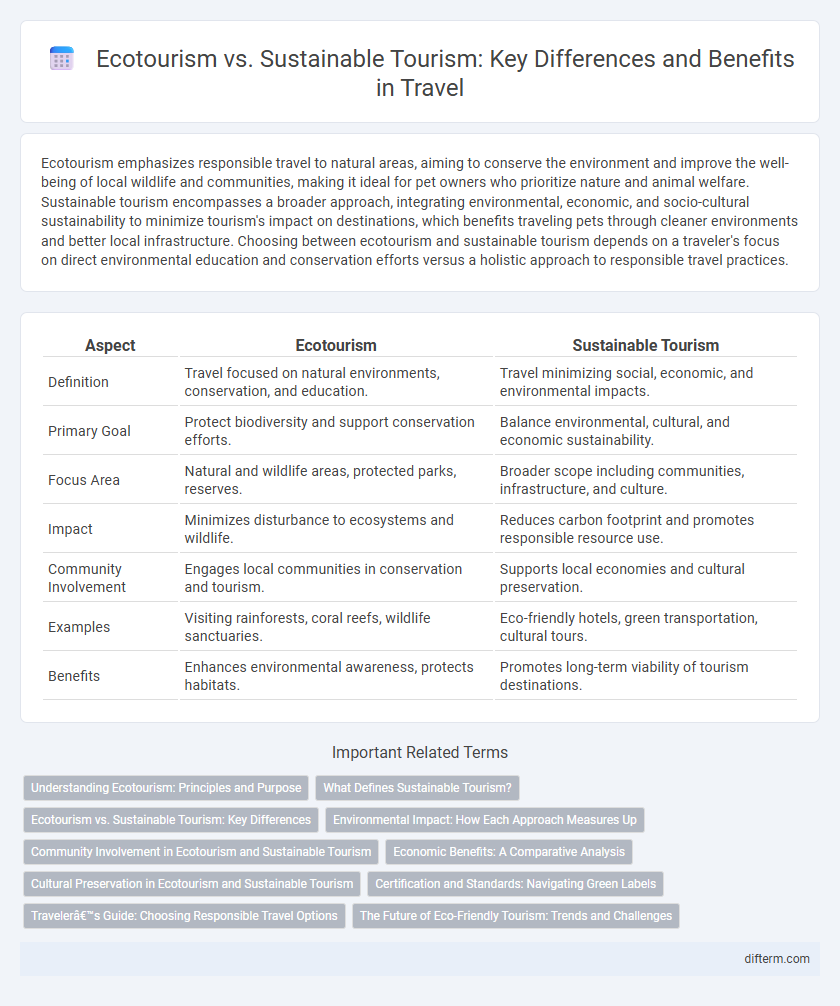Ecotourism emphasizes responsible travel to natural areas, aiming to conserve the environment and improve the well-being of local wildlife and communities, making it ideal for pet owners who prioritize nature and animal welfare. Sustainable tourism encompasses a broader approach, integrating environmental, economic, and socio-cultural sustainability to minimize tourism's impact on destinations, which benefits traveling pets through cleaner environments and better local infrastructure. Choosing between ecotourism and sustainable tourism depends on a traveler's focus on direct environmental education and conservation efforts versus a holistic approach to responsible travel practices.
Table of Comparison
| Aspect | Ecotourism | Sustainable Tourism |
|---|---|---|
| Definition | Travel focused on natural environments, conservation, and education. | Travel minimizing social, economic, and environmental impacts. |
| Primary Goal | Protect biodiversity and support conservation efforts. | Balance environmental, cultural, and economic sustainability. |
| Focus Area | Natural and wildlife areas, protected parks, reserves. | Broader scope including communities, infrastructure, and culture. |
| Impact | Minimizes disturbance to ecosystems and wildlife. | Reduces carbon footprint and promotes responsible resource use. |
| Community Involvement | Engages local communities in conservation and tourism. | Supports local economies and cultural preservation. |
| Examples | Visiting rainforests, coral reefs, wildlife sanctuaries. | Eco-friendly hotels, green transportation, cultural tours. |
| Benefits | Enhances environmental awareness, protects habitats. | Promotes long-term viability of tourism destinations. |
Understanding Ecotourism: Principles and Purpose
Ecotourism emphasizes responsible travel to natural areas that conserves the environment and sustains the well-being of local communities, prioritizing conservation, education, and low-impact activities. It differs from sustainable tourism by specifically targeting fragile ecosystems and promoting awareness through hands-on experiences and environmental stewardship. Core principles include minimizing ecological footprints, supporting biodiversity protection, and fostering cultural respect among travelers and hosts.
What Defines Sustainable Tourism?
Sustainable tourism prioritizes minimizing environmental impact, supporting local economies, and preserving cultural heritage while ensuring long-term resource availability. It emphasizes responsible travel practices that benefit host communities and protect natural ecosystems. Unlike ecotourism, which specifically centers on nature-based experiences, sustainable tourism encompasses a broader approach integrating environmental, social, and economic sustainability principles.
Ecotourism vs. Sustainable Tourism: Key Differences
Ecotourism emphasizes responsible travel to natural areas that conserves the environment and improves the well-being of local people, often involving wildlife observation and conservation efforts. Sustainable tourism encompasses a broader approach that incorporates environmental, social, and economic sustainability across all types of tourism, ensuring resource preservation and equitable benefits. Key differences lie in ecotourism's specific focus on nature-based experiences and direct conservation impact, while sustainable tourism aims for long-term balance in tourism development worldwide.
Environmental Impact: How Each Approach Measures Up
Ecotourism emphasizes minimal environmental footprint by promoting conservation, wildlife protection, and educating tourists about natural habitats. Sustainable tourism takes a broader approach, focusing not only on environmental preservation but also on supporting local economies and communities to create long-term benefits. While both reduce negative impacts, ecotourism is more specific to natural areas, whereas sustainable tourism integrates environmental, social, and economic factors comprehensively.
Community Involvement in Ecotourism and Sustainable Tourism
Community involvement in ecotourism centers on empowering local residents to actively participate in decision-making, benefiting from conservation efforts and preserving cultural heritage. Sustainable tourism integrates community engagement by promoting economic opportunities while minimizing environmental impact and ensuring social equity. Both approaches prioritize local stakeholder collaboration to create authentic experiences and long-term benefits for host communities.
Economic Benefits: A Comparative Analysis
Ecotourism generates economic benefits by promoting conservation and supporting local communities through small-scale, environmentally friendly activities that attract niche markets willing to pay premium prices. Sustainable tourism offers broader economic impacts by integrating long-term resource management, enhancing infrastructure, and creating diverse employment opportunities within larger tourist destinations. Both approaches contribute to economic growth, but ecotourism emphasizes preserving natural assets as vital economic resources, while sustainable tourism balances environmental, social, and economic goals for regional development.
Cultural Preservation in Ecotourism and Sustainable Tourism
Cultural preservation in ecotourism emphasizes authentic community engagement and respect for indigenous traditions, ensuring that local heritage remains intact while benefiting from responsible tourism. Sustainable tourism integrates cultural preservation by promoting practices that minimize negative impacts on cultural sites and support the continuity of cultural expressions through community-led initiatives. Both approaches aim to empower local populations, but ecotourism often prioritizes immersive cultural experiences linked to conservation efforts, whereas sustainable tourism adopts a broader strategy encompassing economic, environmental, and social dimensions.
Certification and Standards: Navigating Green Labels
Certification and standards play a crucial role in distinguishing ecotourism from sustainable tourism by providing verifiable green labels that ensure environmental responsibility and community benefits. Leading certifications like Green Globe, Rainforest Alliance, and Ecotourism Australia set rigorous criteria for resource conservation, biodiversity protection, and socio-economic equity, guiding travelers toward responsible choices. Navigating these labels helps tourists identify authentic eco-friendly experiences while encouraging operators to adopt transparent sustainability practices aligned with global benchmarks.
Traveler’s Guide: Choosing Responsible Travel Options
Travelers choosing responsible travel options should prioritize ecotourism for immersive experiences in pristine natural environments that actively support conservation efforts and local communities. Sustainable tourism emphasizes minimizing environmental impact and promoting social equity by integrating eco-friendly practices throughout the entire travel experience, from transportation to accommodation. Understanding the distinctions helps travelers select trips that align with their values while contributing positively to destinations' long-term health and cultural integrity.
The Future of Eco-Friendly Tourism: Trends and Challenges
The future of eco-friendly tourism is shaped by growing demand for destinations that minimize environmental impact while supporting local communities. Emerging trends emphasize carbon-neutral travel, regenerative tourism practices, and technological innovations for resource management. Key challenges remain in balancing economic growth with conservation efforts and ensuring equitable benefits across global regions.
ecotourism vs sustainable tourism Infographic

 difterm.com
difterm.com